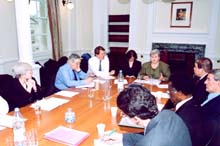How to do business for good
Church Times, 22 November 2002:
 |
 |
 |
Upstairs sat 20 people, among them the head of the World Bank, the vice-chairman of the world’s biggest commercial bank and key figures who manage the investments of the major faiths – $7 trillion |
Religions have a big stick, says Paul Vallely. It’s the huge funds that they control
From the Church Times page 1, November 22 2002
Size does matter, as the actuary said to the bishop. I met a woman the other day who controls investments for the $10 billion pension fund of the United Methodist Church in North America. She was with a colleague from the Interfaith Centre on Corporate Responsibility (ICCR) whose members between them control ten times that amount – the $110 billion assets of 275 US religious institutions. They were in London to discuss something that involved far more money still.
Last week, leaders of the world’s 11 major faiths met at the Banqueting Hall, Whitehall, for a religious celebration of the Queen’s Golden Jubilee. Under the auspices of the Alliance of Religions and Conservation, some 300 senior religious figures from all round the world took part in a carnival on creation. Yet behind the scenes something even more extravagant was going on.
In a room upstairs, just 20 people were sitting around a table. But they included the head of the World Bank, the vice-chairman of the world’s biggest commercial bank and a number of the key figures who manage the investments of the major faiths – who between them own $7 trillion in stocks and shares, which constitute between eight and ten per cent of the world’s total market capital.
They were discussing how the religions could reposition those investments in more socially responsible areas – non-renewable resources, eco-friendly land use, job-creation schemes, affordable housing programmes and micro-credit (loans for people too poor for the normal banking system to bother with).
Was this pie in the sky – or in the heavens at any rate? The big beasts of the commercial banking world didn’t think so. “We can tell you how many shares you’d need in any particular firm before they’d be forced to take notice of you,” said the man from the biggest bank who could sense that here was something that would be good for his bank balance as well as his soul.
This was a world away from the old days when church activists simply boycotted companies of which they didn’t approve. When big money goes into a company, it must take notice of the moral agenda of such a large shareholder. In the United States, the Churches (through ICCR) are increasingly urging firms to look to a “triple bottom line” in which “people, planet, profit” is the slogan.
There’s another key change. They select investments using the “best in class” method. “It’s no good saying: ‘we don’t want to invest in an energy because they pollute’,” one new-style banker said. “We all need energy. So to invest responsibly you have to find for your portfolio the energy company that is better on social and eco issues.”
In addition, of course, they continue to work on “micro-financing” for the poorest of the poor. Ironically, though these schemes are supposed to produce a token return of only two to three per cent, last year because of the stock-market collapse, they turned out to be the top-paying investment.
Schemes like the one in the US are now being set up in Canada, Australia and the UK. But the big hope is that the major faiths worldwide could put their money where their mantras are. They hold most of their $7 trillion in things such as property, but some $1000 billion of it is liquid. If that alone were put into socially responsible investments it could make the world a decidedly better place. And if the personal investments of the faithful were persuaded to follow, then last week’s meeting really could turn out to be what the woman from the United Methodist Church called “a new strategic moment”.
© Paul Vallely
Link to International Interfaith Investment Group (3iG).
|

